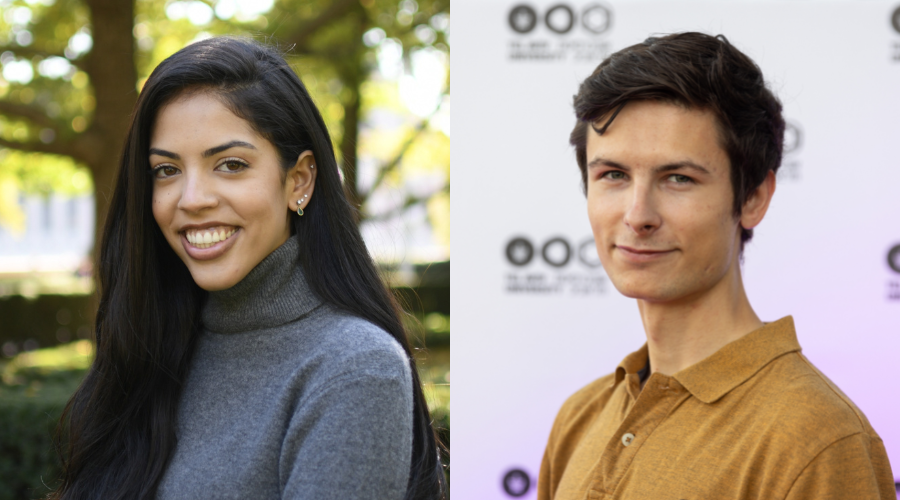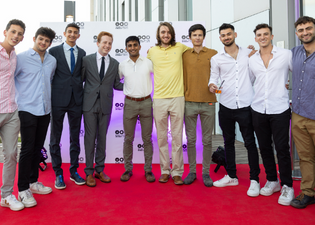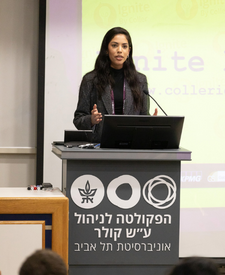Innovation and Community Beyond Borders: The Dual Degree Student Experience
Hailing from Gedera, Israel and Vilnius, Lithuania respectively, Lee Tzanani ‘24GS and Kristupas Packauskas ‘24GS share their reflections on their Dual Degree journeys so far as they round the corner on their third year in the program.

As part of the first Dual Degree cohort, Lee Tzanani ‘24GS and Kristupas Packauskas ‘24GS kicked off their junior year by transitioning from Tel Aviv University’s coastal Mediterranean campus to Columbia University’s Morningside campus in New York City this fall. They share the challenges and rewards of their unconventional educational paths, and advice for current and future Dual Degree students.
What is your hometown and major(s)?
Lee: My hometown is a place called Gedera, in Israel. It’s a very small town south of Tel Aviv. You can have two majors in the program [one at TAU and one at Columbia], so my first major is philosophy and my second major is cognitive science.
Kristupas: My hometown is Vilnius, Lithuania and my majors are information science-business and philosophy.
What drew you to the Dual Degree Program?
Lee: I’m a nontraditional student for the Dual Degree Program, which actually at GS is very traditional in a way! But I grew up mainly in Israel, spending a few years in Paris and Boston, and then immediately after high school I went to the army for four years. After, I worked at a cybersecurity startup, so I had more time after high school to really think about what I wanted to do. For me, school wasn’t necessarily the obvious next option, it was more of a choice, but the fact that I found the Dual Degree Program actually made my choice much easier. The concept of two majors, two universities, two countries, and a liberal arts education, which is quite rare in Israel: it really drew me in.
"With Tel Aviv and New York being hot spots of culture, scholarship, and innovation, splitting my time in college between TAU and Columbia sounded like a near-unbeatable proposition."
Kristupas: I was drawn to the Dual Degree by the opportunity to have an incredibly unique college experience. With Tel Aviv and New York being hot spots of culture, scholarship, and innovation, splitting my time in college between TAU and Columbia sounded like a near-unbeatable proposition in terms of how much it would put me outside of my comfort zone and allow me to expand my worldview. Moreover, as someone who has always had an array of academic interests, the program really appealed to me in how much it encouraged curiosity and allowed for pursuing a rigorous but well-rounded education.
What were the best and most challenging parts of arriving at Tel Aviv University as a first-year student?
Lee: I already lived in Tel Aviv, so for me the transition was about becoming a student again. It was really fun, especially having a lot of liberty in my day-to-day life as compared to working in a high pressure environment. The most challenging part was probably that for the first semester, school was on Zoom because of COVID-19, but by the spring classes were hybrid in-person and online.
I would also say that Tel Aviv is an amazing city, so even being from Israel, having the opportunity to live there for a few more years was wonderful. I lived a seven-minute walk from the beach, while also being in the middle of perhaps the most vibrant start-up scene in the world. I think especially for students who haven’t lived there before, Tel Aviv has a tremendous amount to offer – and they have to take advantage! Israel is also a small country, so in terms of traveling around Israel, Tel Aviv is a great location to be at.

Kristupas: Very exciting and slightly intimidating at the same time as I had never been to Tel Aviv before my first semester. There were certainly many challenges—including everyday matters such as navigating the local bureaucracy, or getting around without knowing a single word of Hebrew—but the unforgettable academic and cultural experiences I had made those hurdles worth it.
What has it been like coming to Columbia as a junior?
Lee: TAU is very homey and small, so coming to Columbia and New York City, while there are parallels between the two places, does feel like a move to a bigger scale. It’s something to get used to, but also a very exciting transition. I am enjoying the academic and extracurricular parts of the university, while also exploring the city’s infinite opportunities. It can be both energizing and overwhelming.
Academically, it’s also quite a different style. The classes at TAU are usually small, but at Columbia classes range from 12 people to 300 people. I think also one challenge is that with our program we have quite a few requirements that are tangled between the two institutions, especially with our two majors. I recommend doing your research and working with your advisors to be on top of things like knowing major requirements and prerequisites for certain classes.
Kristupas: Coming to Columbia as a junior certainly has its downsides, and navigating the academic differences between the two universities is definitely a major challenge at first, but there are many ways of finding support and a sense of community at Columbia. One thing I wish I did more of during my first semester, however, is exploring New York. Between your classes, friends, and clubs, it's very easy to spend all of your time in Morningside Heights, but NYC has so much to offer in so many ways. You just have to make an effort and venture out of the Columbia bubble.

On both campuses, what groups or activities have you been part of that have been most meaningful?
Lee: Clubs in Israel are different from the U.S. in that if you’re “part of” the club, that means you help run the club and you create opportunities and events for everyone on campus. You don’t have to join any club to go to its events. But at TAU, I was part of the leadership of the Entrepreneurship Club which had both undergraduate and graduate students. Everything at that club was initially in Hebrew and I took it upon myself to advocate for more events in English because so many of my peers were not Hebrew-speakers. The club would have lectures from entrepreneurs and CEOs that were inspiring and who you could really learn from, but if there’s a language barrier, you can’t participate. It was amazing to be part of the team, to connect with people, and to specifically reach out to people from our program and make sure they’re aware of our club’s events. There are so many more organizations on campus that students can be a part of, whether that’s attending events or being a club leader.
Kristupas: Columbia has no shortage of clubs and organizations, and so I really encourage any incoming Dual Degree students to take advantage of what Columbia has to offer. Some of the groups that I have been involved in at Columbia are the Columbia Daily Spectator, student government, the Columbia Social Entrepreneurship Group, and GS Alliance.
I think a common misconception that you sometimes hear is that it is impossible for Dual Degree students to be seriously involved with clubs at Columbia because they are coming in as juniors. In my opinion, however, that is very often not the case—if you find something you love here and make an effort to get involved, you will almost certainly be able to, and I think it'll immeasurably enrich your experience of being at Columbia.
What advice would you have for other Dual Degree students, especially entering first-years and third-years headed to the Columbia campus?
Lee: Looking back, my main advice would be to really track your academic progress and requirements, especially if you’re interested in doing two majors. I would also say that you should consider whether a liberal arts education is what you want; I think it really suits some people and it might not suit others. But if that’s something you’re interested in, then this program is really worthwhile.
Kristupas: Columbia and New York can be a lot at certain times, but you are not alone in navigating this transition—the Dual Degree community and the university as a whole can be an incredibly supportive space, so don't hesitate to reach out to your upperclassmen, faculty, and advisors as you are finding your place here.
